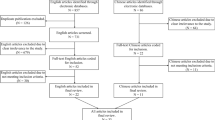Abstract
The cross-cultural adjustment research literature has largely been conducted from an atheoretical perspective. When a theoretical framework is imposed, the U-Curve adjustment theory has been the one most commonly used. The lack of a comprehensive review of the empirical literature on the U-Curve adjustment theory has allowed scholars to accept or dismiss the theory on grounds other than that of empirical evidence. This paper reviews the empirical literature and proposes a theoretical framework and research agenda for future research on cross-cultural adjustment.
Similar content being viewed by others
Author information
Authors and Affiliations
Additional information
*J. Stewart Black (Ph.D., University of California, Irvine) is an Assistant Professor in the Amos Tuck School of Business Administration at Dartmouth College. His research is primarily on the topic of international human resource management.
**Mark E. Mendenhall (Ph.D., Brigham Young University) is the J. Burton Frieson Chair of Excellence in Business Leadership in the School of Business Administration at the University of Tennessee, Chattanooga.
Rights and permissions
About this article
Cite this article
Black, J., Mendenhall, M. The U-Curve Adjustment Hypothesis Revisited: A Review and Theoretical Framework. J Int Bus Stud 22, 225–247 (1991). https://doi.org/10.1057/palgrave.jibs.8490301
Received:
Revised:
Accepted:
Published:
Issue Date:
DOI: https://doi.org/10.1057/palgrave.jibs.8490301




